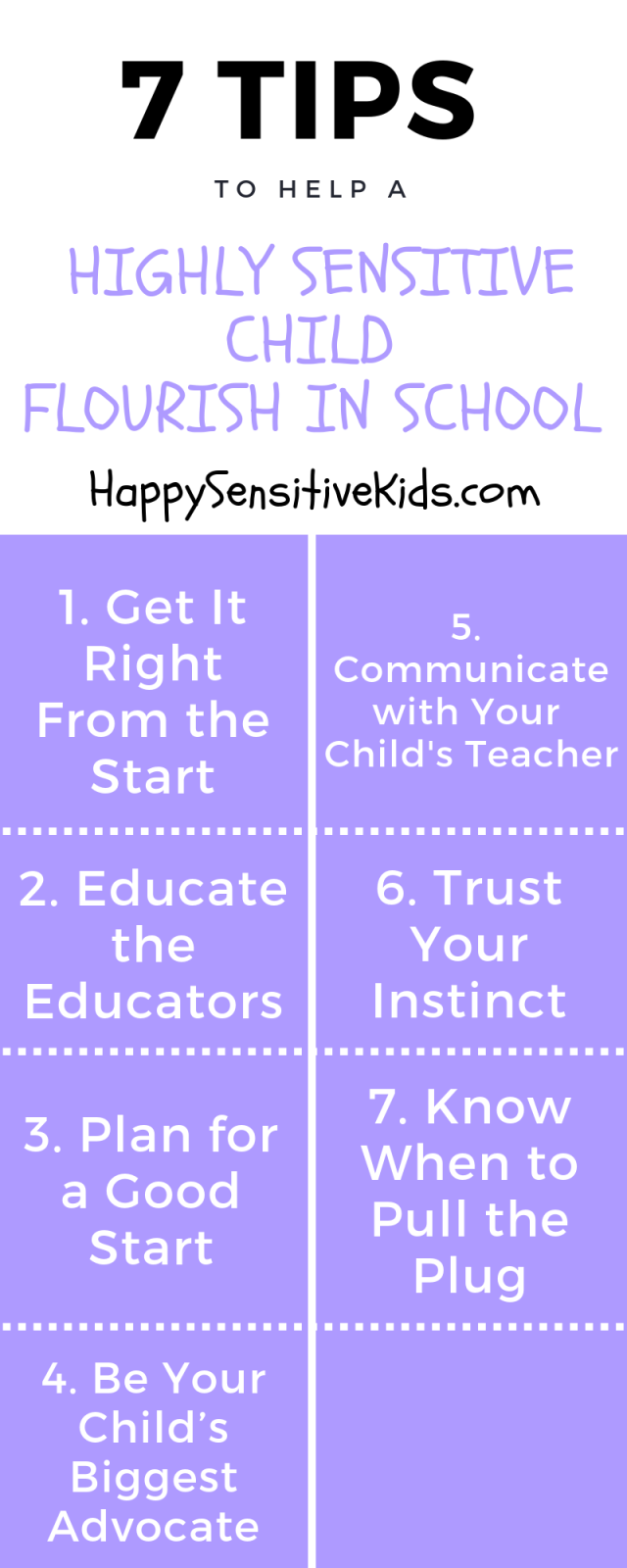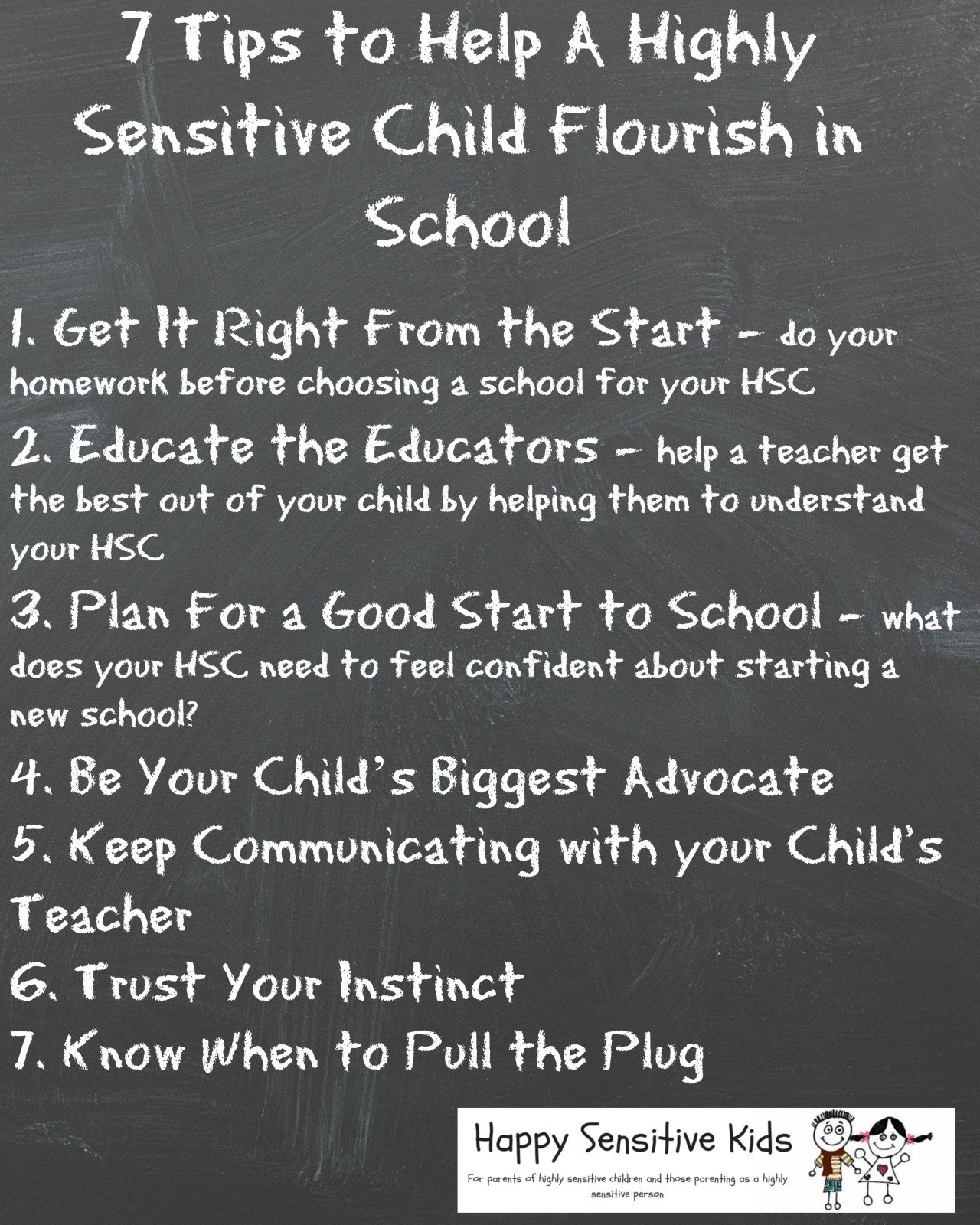In order to ensure that your highly sensitive child flourishes, and succeeds in school, you need to understand your child, and what they actually need. So how to help a highly sensitive child at school?
Your highly sensitive child will struggle in school at some point. That’s a fact. A highly sensitive child (HSC) needs the right support to flourish in school. Working out exactly what they need is half the problem.
Here are seven tips to help you.
Related: How To Help A Sensitive Child Manage Intense Emotions
First Days Matter
My son started primary school at the beginning of 2011. It was a rough ride from day one. One of his regular teachers was on maternity leave so every week the void was filled with yet another face.
From one morning to the next it was hard to know which face would greet him at the classroom door – it didn’t give me a comfortable feeling, let alone my four-year-old son.
My HSC is unsettled by uncertainty, change, and new environments. Like most highly sensitive children.
His first day at school was a drama that will occupy a space in my memory for all time. His father and I had to physically drag him into his new classroom.
Although the teacher was great with him, for my son she was an unknown entity. He kicked, he screamed and he cried. We left the classroom with the desperate cries of “mama” and “papa” ringing in our ears.
I could feel my heart breaking as we walked through the recently abandoned hallways. If I could go back in time I would go back into that classroom, scoop him up, and take him home. It was a sign of things to come.

This nightmare was the morning ritual for his first week. The kicking and screaming in the classroom stopped but the daily tears at the classroom door took weeks to dry up.
The reluctance to go to school lasted for months and the tantrums trying to get him back to school after lunch didn’t end until the school year did.
Related: 10 Signs Your Child is an Old Soul
It is clear, in hindsight, that his teacher and I weren’t on the same page from the off. His teacher insisted that the best thing for my son was to throw him in at the deep end and have him come to school full time as soon as possible. My mama instinct said a softly softly approach fitted my four-year-old HSC better.
Two and a half years later, my son returned smiling from his familiarization morning at the new school we had chosen for him.
Two and a half years after he first started school I was a much wiser mother tuned in to my son’s needs in the classroom – and it helped us find a new school that was more in tune with my son’s needs.
He is now a ‘happy to go to school’ (most of the time) eight years old and we haven’t looked back.
Here are seven pearls of wisdom I’ve picked up during our school journey.
7 Tips to Help A Highly Sensitive Child Flourish in School
1. Get It Right From the Start
High sensitivity is not understood in every school, despite up to 20% of children being highly sensitive. If your child is just starting out in school you have the perfect opportunity to get it right from the start.
Talk to the school director about high sensitivity and what it means for your family. If you get blank stares or cries of “it’s not scientifically proven” (or worse) then move on to the next school on your list.
2. Educate the Educators
A teacher needs to fully understand the sensitivities of your child and the implications of these in the classroom for your child to thrive in school.
Many HSCs need a trusted environment to flourish and will sense if a teacher does not behave genuinely with them. They will be frightened by stern or a teacher that regularly shouts at the class.
My eldest told us, once he had changed schools, that he went many times to his former teacher to tell her he felt so tired in the classroom.
It was his way of explaining that his bucket was full and he needed the time out. Her response was that he should go to bed. It didn’t help him and he stopped communicating how he felt with her.
There was no going back from there. It is imperative that teachers understand that an HSC needs downtime and feel quickly overwhelmed in a busy classroom.
Share the ‘Tips for Teachers’ sections that some books on the topic of HSCs have with your child’s teachers.
A great starting point is the teacher tips in Elaine Aron’s The Highly Sensitive Child book.
If a teacher or school does not embrace your child as an HSC then switch classes or consider other schooling options.
If those spending so much time with your child do not take your child’s needs seriously then school life could be problematic for your HSC. How can a teacher get the best out of a child they don’t even begin to understand?
3. Plan for a Good Start
- Assess what your child needs before starting a new school or class.
- The unknown is often frightening for an HSC so an introduction to the teacher and a preview of the new classroom before they begin at school can make a huge difference.
- Make a photo book of the school to get your child familiar with the environment before they are in it daily.
- Ask the teacher to outline how the first day will look.
- Discuss whether you can stay with your child until they are settled and feeling more confident.
If a child starts school with a positive experience it will certainly help in the long run.
4. Be Your Child’s Biggest Advocate
You will need to stand up for your child time and time again. If your child has been seated in a busy aisle when she needs a quiet space then speak up.
If your child comes home pale and wiped out then talk to the teacher about the school day. If your child spends the evening crying because he is overstimulated from a busy day, communicate with the teacher.
If you are yourself a highly sensitive person (HSP) this goes against the grain but you do need to be your child’s biggest advocate, even if it feels uncomfortable.
5. Keep Communicating with Your Child’s Teacher
Keep all communication channels open with your child’s teacher. When a school day goes horribly wrong for your HSC sit with the teacher and work out why. Keep talking.
And the same advice applies to your HSC too – talk to your child daily so they can share their school day with you see through their eyes.
Ask what they enjoyed about their day, what the worst part of their school day was, establish if anything evoked significant emotion (positive or negative).
6. Trust Your Instinct
As a parent, you know your child better than any other person on the planet. If you think your child is under par or has been affected by something at school you will usually be right.
Don’t rely on a teacher to confirm your instinct – your child is one of many in a class and it is impossible for a teacher to see and notice everything.
Trust your instinct and act on it.
Related: 25 Characteristics Of An Indigo Child
7. Know When to Pull the Plug
Or in other words, don’t be afraid to admit defeat if your HSC is not blossoming in his or her current school.
There are always other options and whilst many HSCs don’t like change they may well surprise you by positively accepting an alternative if they feel more at home in a new environment. Luckily I’m speaking from first-hand experience.
Remember that HSCs feel so much more than other children and many have a sense for what feels right. They know themselves where they feel at home.

Want to know more about how to be there for a highly sensitive child? Check this video out below!
Written by Amanda van Mulligen Originally appeared on Happy Sensitive Kids











Leave a Reply
You must be logged in to post a comment.